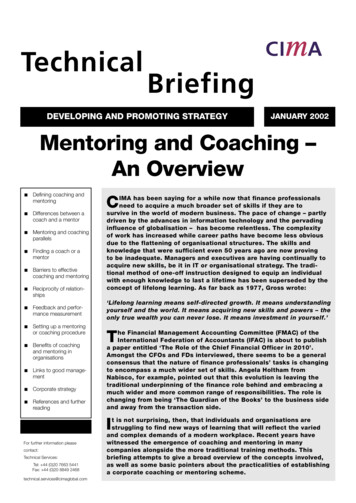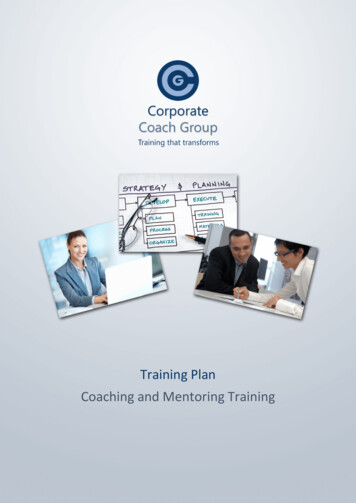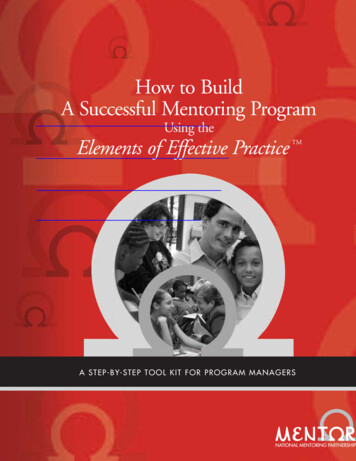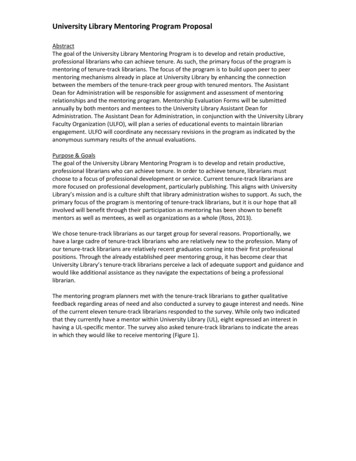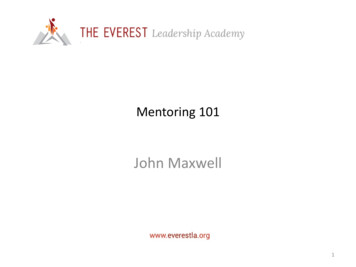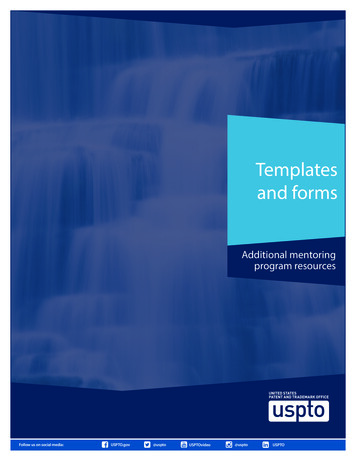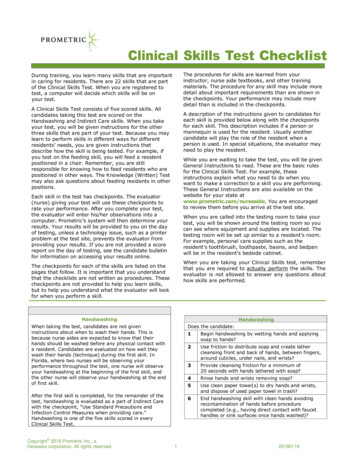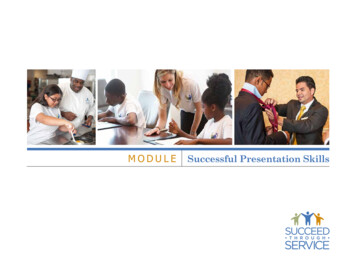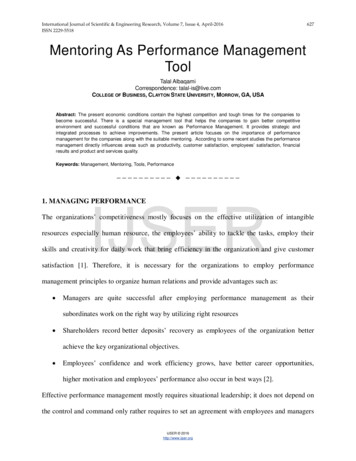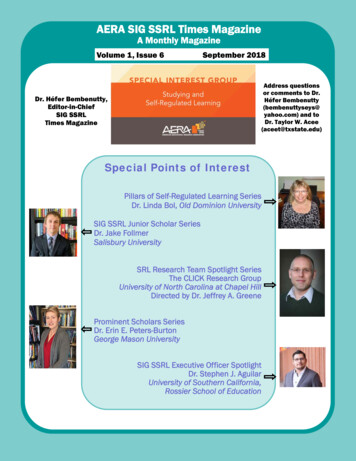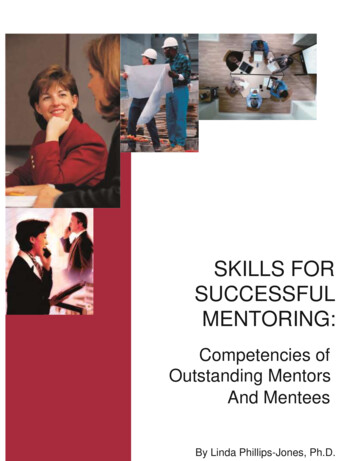
Transcription
SKILLS FORSUCCESSFULMENTORING:Competencies ofOutstanding MentorsAnd MenteesBy Linda Phillips-Jones, Ph.D.
SKILLS FOR SUCCESSFULMENTORING 2003 by Linda Phillips-Jones, Ph.D.Author, The New Mentors and Protegesffective mentoring requirespartnerships as well as individuals unablemore than common sense.to identify any mentors in their lives. TheResearch indicatesthatconclusion: mentoring was much morementorsand menteesexaminable and yet more complex thanwho developandfirst thought.manage successful mentoringpartnerships demonstrate a numberOnthe“demystifying”side,of specific, identifiable skills thatPhillipsJones discovered that effectiveenable learning and change to takementors and mentees use specificplace. This strategy bookletprocesses and skills throughout theirdescribes these skills and provides arelationships. Further, the skills andtool for you to assess yourselfprocessescanbelearned,andinformally on each skill.relationships can be better––moreenjoyable,productive,andevenThe Identification oftimeefficient––as a result.EMentoring SkillsFor years, individuals assumedthat the process of mentoring wassomewhatmysterious.Theserelationships just happened, and“chemistry” had to be present. It wasimpossible(evensomewhatsacrilegious) to analyze and describethe specifics of what was going on inthese arrangements. Analyzing andputting names to behaviors wouldtheoretically kill them.Some people were able to findmentoring relationships, while manyindividuals were unaware of how toget started with mentoring andmissed out on one of the mostpowerful development strategies everdevised.LindaPhillips-Jones(1977)studied hundreds of mentor-menteeAdditional research by The MentoringGroup revealed that unless a fairlystructured process and specific skills areapplied, mediocre mentoring relationshipsoccur. Not much happens, and participantsbecome frustrated with their well-intendedbut haphazard efforts. Worse, ng doesn’t work.On the positive side, when individuals usethese skills and add structure, important,satisfying changes take place in the lives ofboth mentees and mentors.A skill is a learned, observable behavioryou perform that indicates (to someoneelse) how well you can do something. Theset of skills described here constitutes youroverall ability to mentor and be mentored.If you possess these skills to an adequatequality level––and if you use them as1
frequently as called for—your chances ofhavingmutuallysatisfyingandproductive mentoring relationships willbe greatly enhanced. The model on thenext page illustrates the shared coreskills used by both mentors and menteesand the unique skills needed by eachgroup.To help you be a more skilled mentorand mentee, look at the model, reviewthe descriptions of these mentoring skillsand the behaviors that make up eachone, and start using the skills with thepeople in your life. appear genuinely interested bymaking encouraging responsessuch as “Hmmm . . .” and“Interesting . . .” or sometimesreflecting back (paraphrasing)certain comments to showyou’ve grasped the meaning andfeelings behind the message; ly into people’s eyes,THE MENTORING SKILLS MODELSHARED CORE SKILLS
immediate problem solving, see if youcan help them be better listeners andproblem explorers.Core Mentoring SkillsBoth mentors and mentees shouldutilize the following core skills in theirmentoring partnerships.2. Building TrustThe more that your mentors andmentees trust you, the morecommitted they’ll be to yourpartnerships with them, and the moreeffective you’ll be. This trust developsover time—if your mentors andmentees observe certain appropriatebehaviors on your part. To becometrustable, you must:1. Listening ActivelyActive listening is the most basicmentoring skill; the other skills build on—and require—it. When you listen well, youdemonstrate to your mentors andmentees that their concerns have beenheard and understood. As a result, theyfeel accepted by you, and trust builds.The way you indicate you’re listeningintently is by performing severalobservable behaviors. For example, ifyou’re an excellent listener, you: keepconfidences shared by yourmentors and mentees; spend appropriate time together; follow through on your promises tothem; respect your mentors’ and mentees’ avoid interrupting mentors andmentees while they’re talking; remember and show interest inthings they’ve said in the past(“By the way, how did themeeting with your managergo?”); and boundaries;nodding your head, leaningslightlytowardthem,frowning, or smiling whereappropriate; admityourerrorsandtakeresponsibility for correcting them; and tactfully tell your partners if and whyyou disagree or are dissatisfied withsomething so they’ll know you’rehonest with them.Particularly with cross-difference(e.g., gender, culture, style, age)mentoring, trust building is crucialand has to be developed over time.summarize the key elements ofwhat each of you said.3. EncouragingAccording to Phillips-Jones’ research,the most valued mentoringResist the impulse always to turnthe conversation to your experiencesand opinions and to find immediatesolutions to problems you may behearing.Listencarefullyfirst;problem solve much later. If yourmentors and mentees have a habit ofskill is giving encouragement. Thisincludes giving your mentoring partners6
recognition and sincere positive verbalfeedback.Mentors and mentees at severalFortune 500 companies revealed ininterviews that positive verbalreinforcement—praise—was rareand even publicly discounted intheir organizations. However, mostadmitted enjoying being recognizedfor accomplishments and abilitiesand receiving positive feedback—provided such attention was sincereand not overdone. Interviewees saidthey wished such behaviors were agreater part of their organizationalcultures.When was the last time you receivedtoo much praise? If never, you’re notalone. Effective mentors encourage theirmentees, which in turn helps increase thementees’ confidence and enables them todevelop.At the same time, successful menteesmake a point of positively reinforcingtheir mentors, which serves to keep thementors focused and motivated. Providegenuine, positive feedback to yourmentors and mentees on a regular basis.While there are many ways toencourage, and mentors and menteescan differ in the types and amounts ofencouragement they like, you can: complimentyourmentoringpartners on accomplishments andactions; point out positive traits (such asperseverance and integrity) inaddition to their performance andaccomplishments; praise them privately, one-on-one; commend them in front of other people(being sensitive to any cultural andstyle preferences regarding publicpraise); express thanks and appreciation; write encouraging memos or e-mail andleave complimentary voice mail; and let them know how you use any helpthey give you.Be certain that your praise andencouragement are sincere. In mentoring,err in the direction of too much praise,rather than too little.Some human development expertsrecommend a ratio of four or five praisesfor every corrective remark.4. Identifying Goals and CurrentRealityWhether you’re a mentor or mentee, youshould have a personal vision, specificgoals, and a good grasp of current reality.As a mentor, be clear on and talk to yourmentees about their visions, dreams, andcareer/life goals. They’ll be interested inyour current reality (your view of yourstrengths and limitations as well as thecurrent reality of situations within yourorganization) and want help recognizingtheirs as well.As a mentee, you also need this skill.Before asking for help, you should knowyour tentative goals, strengths, whatdevelopment you need, and the specificassistance you’d like. You should discussthese with your mentors. The more awareyou are of these, and the more accuratelyyou can convey them to potential helpers,the more likely they’ll be to assist your nextsteps. To demonstrate this mentoring skill:
know what’s important to you, whatmentors, providing formal mentoring toat least one promising individual a year,and hopefully, running one of ourfactories in about five years. My back-upgoal is to leave and start my owncompany.”you value and desire most; recognize areas in which you’re ableto perform well, very concreteexamples of behaviors you canperform at the good-to-excellentlevel;Model this skill by continually workingon your own goals. Show your mentorsand mentees how to take a less thanideal current reality and pull that realitytoward their goals. identifyspecific weaknesses orgrowth areas observed in yourselfand ones noted by others; set tentative one- to five-year goalsCritical Skills for Mentorsto reach in your personal life andcareer; andIn addition to the core mentoringskills described above, mentors useseveral specific competencies in anattempt to help mentees develop. describe accurately the reality ofyour abilities and situations.Effective mentors and mentees areconstantlyfine-tuningthisselfknowledge, incorporating new feedbackand observations on a regular basis.Peter M. Senge, in The Fifth Discipline,mentions these skills as part of “personalmastery,” which he calls a journey, not adestination.1. Instructing/DevelopingCapabilitiesProbably all mentors do someteaching or instructing as part oftheir mentoring. The skill is especiallyimportant in formal mentoring. Thisseldom means that you’ll give formalspeeches and lectures. Instead, yourinstructing will usually be moreinformal—from modeling specificbehaviors to conveying ideas andprocesses one-on-one, in a tutoringmode. You’ll:One effective individual, a formerengineer who was currently adivision manager (and a mentee intwo mentoringpartnerships),demonstrated her skill of identifyinggoals and current reality by writingthis: “My long-range goal is to be ageneral manager or vice presidentwithin ten years. My technical skillsas an engineer and my skills (as anoperations manager) are strong. Inow manage 75 men and women.I’m weaker in sales and marketing.” “I expect to reach my goal bycontinuing to build our business,gaining some strong marketing andsales OJT in a temporary lateralassignment, getting coaching frommy two— and probably future— 8be a “learning broker” as you assistyour mentees in finding resourcessuch as people, books, software,websites, and other informationsources;teachyourmenteesnewknowledge, skills, and attitudesby explaining, giving effectiveexamples,andaskingthoughtprovoking questions;help your mentees gain broaderperspectivesoftheir
organizationsincludinghistory, values, culture, andpolitics;demonstrateormodeleffective behaviors, pointingout what you’re trying to do;andhelpthemmonitorperformanceandrefocussteps as needed.A key part of your instruction isteaching the mentoring process. Youcan do this by making processcomments—pointing out, naming,and otherwise getting your menteesto recognize which aspect ofmentoring you’re doing at the time—and why.Whoever cares to learn willalways find a teacher.— German proverb2. InspiringOne skill that separates superbmentors from very good ones is anability to inspire their mentees togreatness. By setting an exampleyourself and helping your menteesexperience other inspirational peopleand situations, you can help themonto future paths that excite andmotivate––evenbeyondtheiroriginal dreams. Mentors vary in theirability to be inspiring. See if you can: do inspiring actions yourself whichchallengeyourmenteestoimprove;help them observe others who areinspiring;arrangeotherinspirationalexperiences for them;challenge them to rise above themundane and do important things; in life; and help them recognizeinspiring actions they took in the pastand ways to excel again.It’s always tempting to tell mentees whatto do and, in fact, to have them follow in yourfootsteps. Your challenge as a mentor is toensure that your mentees identify andpursue their own form of greatness, notnecessarily yours.Some outstanding mentors use language—stories, metaphors, and powerful phrases—to inspire their mentees. Is this a mentoringbehavior you could hone during the comingmonths?3. Providing Corrective FeedbackIn addition to giving frequent and sincerepositive feedback, effective mentors shouldalso be willing and able to give menteescorrective feedback.When you observe your mentees makingmistakes or performing in less than desirableways, you should be direct with yourmentees, letting them know what youperceive and providing some better ways forhandling the situations. It will probably bebetter for them to hear it from you than fromothers. This is an aspect of the mentor’sprotection skill, Managing Risks, describedlater.One of the first things you can discusswith your mentees is if and how they’d liketo receive this feedback. People are morewilling to hear corrective feedback if they’vegiven permission and know in advance it’scoming. At the same time, you’ll be morelikely to give feedback if you’re invited to doso. Attempt to: usepositive,non-derogatory,business-like words and tone of voicewith mentees when their behaviors orproducts aren’t satisfactory;
give corrective feedback in private; give the feedback as soon as feasible after the performance; give specific (as opposed to vague)feedback on behaviors; and offer useful suggestions for them totry next time, offering to be aresource when that time occurs.Typical RisksUse the Encouraging skill muchmore often than the skill ofProviding Corrective Feedback.Your mentees probably face business risksand career risks, potential danger zones inwhich they could make large errors andpossibly jeopardize their positions, careers, ororganizations. Here are some examples:4. Managing RisksAnotherdistinguishingcharacteristic of effective mentors istheir willingness and ability toprotecttheirmenteesfromdisasters. One of your tasks is toprevent your mentees from makingunnecessary mistakes as they learnto take appropriate risks. This skillof Managing Risks builds closely onthe core skill of Building Trust,identified earlier. Some refer to thisriskmanagementprocessashelping mentees “step out on thebranch, then fly when ready.”You’ll: counsel, then trust their owndecisions and actions; andifrequestedindifficultsituations, intervene as yourmentees’advocatewithothers.Mentees and mentors in manycorporationshaveidentifiedManaging Risks as an increasinglyimportant mentoring skill.Business RisksDealing incorrectly with customersMissing deadlinesUnderestimating project costsDoing something unethical Compromising onqualityCareer RisksOffending certain peopleTaking the wrong positionStaying in a job too long Not being able tosell others on one’sown ideas Failing tolearn and improveSome of these risks your mentees willrecognize, and others only you—with yourwisdomandexperience—recognize. Still other challenges will seemmore risky to your mentees than they reallyare. Offer to help your mentees identify anddetermine how to handle these risks withrecognition, prevention, and involved in actions andprojects, including somerisks (andmistakes)you’ve experienced;make suggestions to al,personal, and other) injudgment or action;helpthemlearntoprepare well, get wise10
Opening DoorsMentors are usually in a position toprovide visibility for their mentees. Thismeans opening the right doors that allowthem to meet people and to demonstrateto different audiences what they can do.Research has shown that when mentorsvouch for mentees in this way, their workis much more likely to be well received.To open doors, you’ll: put in a good word to people whocould help your mentees reachdesired goals; personallyintroduceyourmentees to appropriate contacts; makecertain your mentees’abilities are noticed by others; give your mentees assignments oropportunities that enable them omers; and suggest otherresources for your mentees topursue.You’ll probably open doors for yourmentees only when you believethey’re ready to go through them.Since your reputation may be affectedby your doing this, you’ll first want tosee your mentees as capable andtrustworthy. Explain this process toyour mentees as part of thedevelopment effort.One mentee raved about how hismentor opened numerous doors forhim. The mentor took him to two keymeetings, allowed him to co-author(with the mentor) several papers, setup an opportunity for the mentee tomake a very visible oral presentationto a group of decision makers, lopmentprogram within the organization.Critical Skills for MenteesIn addition to the core skills describedearlier, mentees need to be competent inseveral areas.1. Acquiring MentorsBecoming a successful mentee isn’t apassive experience. In the spirit of careerselfreliance, you should be very active inselecting and negotiating with severalmentors who can help you succeed. Goodmentors now have a wide choice ofpotential mentees, so you must skillfullyhandle the acquisition process. Forexample, be able to: identify a desirable pool ofindividuals who potentially canprovide you with mentoring; actively search for severalmentors; “sell” potential helpers on theidea of providing mentoring toyou (in addition to—or asopposed to—others they mighthelp); convey your specific needs andgoals to prospective mentors;and negotiate the mentoringarrangementswith yourmentors, including agreements ongoals, expectations, length of therelationships, confidentiality,feedbackprocesses, andmeeting schedules.Fordetailedtipsonacquiringappropriate mentors, see Strategiesfor Getting the Mentoring YouNeed. For more ideas on career self-
reliance, read the excellent book,We Are All Self-Employed, byCliff Hakim. (Both are listed inResources.)learning attitude, be willing to consider newideas, and show an openness to be provenwrong.Unclear about how to become a “quickstudy”? Try what one dedicated mentee did.She earned a degree in education andEnglish then decided to go back to collegeand enter pre-med. The math, physics, andchemistry were daunting—her weakestareas by far. Not wanting to fail, she spentat least eight hours every day readingchapters, re-reading and marking them witha yellow highlighter, typing outlines of thechapters, and studying them alone and withstudy partners. At least two additional hourseach day she found an empty classroom andwrote and rewrote math, chemistry, andphysics formulas on chalkboards until shecould recite them in her sleep.2. Learning QuicklyMentors enjoy working withmentees who learn quickly and takeseriously any efforts to teach them.Typically, your mentors want you tobe a “quick study.” You should workhard at directly and indirectlylearning everything you can asrapidly as possible. Try to: apply the knowledge and skillspresented to you, and be ready totell your mentors how you appliedthem;A quick study? No, a slow study at first. Buteventually she got it—and her 4.0. Howcommitted do you think her professormentors were to her success? observe carefullyandlearn indirectly from themodeled actions of your mentorsand others;3. Showing InitiativeThe newest approach to mentoringencourages the mentees to manage therelationshipsandshowconsiderableinitiative (see the skill, Managing theRelationship, on the next page). Even withthis new trend, some mentors will attemptto lead the relationships and expect you tofollow. Others will expect you to drive theprocess from the beginning. study materials (those given byyour mentors and materials youseek out) related to yourdevelopment areas; integrate new things you learnintoyourownconceptualframework for problem solving;andEither way, they’ll expect you to show theright amount of initiative. They’ll observe thethings you do on your own to develop. Attimes, most mentors will expect somefollowing from you, particularly when youractivities could have ramifications for them(e.g., approaching one of their valuedcontacts). As an effective mentee, you: receive feedback nondefensively.(You should ask for specifics andbe appreciative of the feedback. Ifyour mentors have misperceiveda fact, diplomatically tell them.)As your mentoring relationshipsproceed and mature, you’ll probably haveample opportunities to debate anddisagree with your mentors. In thebeginning, you should display a strong knowwhen and when not to showinitiative; ask appropriate questions to clarify andget more information;12
pursue useful resources on your own; take informed risks (stretch beyondyour usual comfort level) in order toacquire new knowledge, skills, andattitudes; and gobeyond what your mentorssuggest; that is, take their ideas andshow creative or ambitious ways ofusing them.Mentors vary in the amounts andtiming of initiative they like fromtheir mentees. Discuss this early inyour relationships to establishpreferences and expectations and tonegotiate arrangements that workfor all.4. Following ThroughThese days, it’s a mentors’market. Mentees who don’t followthrough on tasks and commitmentsare often dropped and replaced withmentees who do. To demonstrate thisskill: keep all agreements made with yourmentors; complete agreed-upon tasks on time; try out their suggestions and reportback the results; explain in advance if you want tochange or break an agreement; and persist with difficult tasks even whenyou’re discouraged.An informal poll of mentors byPhillipsJones revealed that severalwere frustrated with mentees whofailed to follow through on agreedupontasks. Some mentors even refused to enter new mentoring partnerships. Theyconcluded that they were working harderon their mentees’ lives than the menteeswere doing for themselves!5. Managing the RelationshipEven when your mentors try to take astrong lead, you’re the one who shouldmanage the relationships. It’s yourdevelopment,andyoumusttakeresponsibility for its process and outcomes.To go through this journey, you can: describe the general process ofbeing mentored––how it works andwhy it’s powerful; stay up to date with each of yourmentors on issues between you,goals to reach, satisfaction withyour meeting schedules, etc.; analyze the current status of yourmentoring partnerships, anddetermine where to go next withthem;prepare for the end of your mentoringrelationships; and leave the formal relationships onamicable terms, even if therelationships continue on aninformal basis.Carefully track your mentoringrelationships, and make suggestionsas needed.Final ThoughtsThese are the critical skills needed bymentorsandmenteesforeffectivementoring relationships. As a closingexercise to reinforce your learning,completethementoringskillsselfassessment on the following page.
There are countless ways of achievany road to achieving one’s maximbe built on a bedrock of respect focommitment to excellence, andmediocrity.MY MENTORING SKILLSDirections: Assess your potential to be a successfulmentor and mentee by rating yourself on the followingmentoring skills. For each skill, circle the appropriatenumber. Total the numbers for each part (I, II, andIII), and read the interpretations.— Buck RoManagbaseballQuality of SkillMentoring SkillExcellent Very GoodAdequatePoorPart I. Shared Core Skills1.2.3.4.Listening ActivelyBuilding TrustEncouragingIdentifying Goals and Current Reality55553333Subtotal Core1111Skills000016-Excellent core skills; you could coach others; concentrate improvement efforts on 20fine-tuning your style11- Very good skills; continue to polish those skills that will make you even more effective 15and desirable as a mentor or mentee6-10 Adequate core skills; work on your less-developed skills in order to have betterrelationships5 or You’ll benefit from coaching and practice on core skills; acquire training or coaching,under and observe others who have strong skillsPart II. Mentor-Specific Skills1.2.3.4.5.2025Instructing/Developing CapabilitiesInspiringProviding Corrective FeedbackManaging RisksOpening Doors53105310531053105310Subtotal Mentor SkillsExcellent mentor skills; you could coach others; concentrate improvement efforts onfine-tuning your style with particular mentees14
15Very good skills; continue to polish those skills that will make you even more effectiveand desirable as a mentor1910Adequate mentor skills; work on your less-developed skills in order to acquire strongmentees and have better relationships with them149 or You’ll benefit from coaching and practice on mentor skills; acquire training or undercoaching, and observe others who have strong skillsPart III. Mentee-SpecificSkills1.2.3.4.5.20-Acquiring MentorsLearning QuicklyShowing InitiativeFollowing ThroughManaging the Relationship55310531053103105310Subtotal Mentee SkillsExcellent mentee skills; you could coach other mentees; concentrate any2515-improvement efforts on fine-tuning your style with particular mentorsVery good skills; continue to polish those skills that will make you even more 19effective and desirable as a mentee10Adequate mentee skills; work on your less-developed skills in order to acquire strong14mentors and have better relationships with them9 or You’ll benefit from coaching and practice on mentee skills; get training or coaching,under and observe others who have strong skills13RESOURCES1. Hakim, C. (1994) We Are All Self-Employed: The New Social Contractfor Working in a Changed World. San Francisco: Berrett-Koehler.2. Peterson, D. B. & Hicks, M. D. (1996) Leader as Coach. Minneapolis:Personnel Decisions International, 800.633.4410.3. Peterson, D. B. & Hicks, M. D. (1995) Development FIRST. Minneapolis:Personnel Decisions International, 800.633.4410.4. Phillips-Jones, L. (2003) The Mentee’s Guide: How to Have aSuccessful Relationship with a Mentor. CCC/The Mentoring Group,13560 Mesa Drive, Grass Valley, CA 95949, 530.268.1146.5. Phillips-Jones, L. (2003) The Mentor’s Guide: How to Be the Kind ofMentorYou
Once Had—Or Wish You’d Had. CCC/The Mentoring Group, 13560 MesaDrive, Grass Valley, CA 95949, 530.268.11466. Phillips-Jones, L. (2003) Strategies for Getting the Mentoring YouNeed: A Look at Best Practices of Successful Mentees. CCC/TheMentoring Group, 13560 Mesa Drive, Grass Valley, CA 95949, 530.268.1146.7. Phillips-Jones, L. (2001 revision) The New Mentors and Proteges: Howto Succeed with the New Mentoring Partnerships. CCC/The MentoringGroup, 13560 Mesa Drive, Grass Valley, CA 95949, 530.268.1146.8. Senge, P.M. (1990) The Fifth Discipline: The Art & Practice of theLearning Organization. New York: Doubleday.About the AuthorDr. Linda Phillips-Jones was a licensed psychologist, the author of variouspublications, and a consultant to a wide range of organizations. Dr. Phillips-Jonespassed away inDecember of 2006 after a valiant six-year fight with four rounds of cancer. CCC/TheMentoring Group continues to promote Dr. Linda's mentoring vision through herpublications and philosophy on mentoring.16
This booklet appears as a chapter in The Mentoring Coordinator’s Guide,The Mentor’sGuide, and The Mentee’s Guide. For copies of any of these Guides, contactCCC/The Mentoring Group, 13560 Mesa Drive, Grass Valley, CA 95949,https://mentoringgroup.com.For additional copies of this booklet, contact CCC/The Mentoring Group. Phone:530.268.1146; fax: 530.268.3636; or e-mail: info@mentoringgroup.com. CheckProducts at https://mentoringgroup.com for information on quantity discounts.
Core Mentoring Skills Both mentors and mentees should utilize the following core skills in their mentoring partnerships. 1. Listening Actively Active listening is the most basic mentoring skill; the other skills build on— and require—it. When you listen well, you demonstrate to your mentors and mentees that their concerns have been
